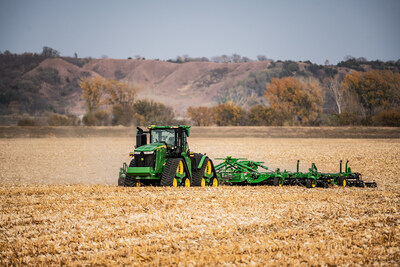John Deere Reveals New Autonomous Machines & Technology at CES 2025
Rhea-AI Summary
John Deere (DE) unveiled several new autonomous machines at CES 2025, expanding its autonomous technology portfolio across agriculture, construction, and commercial landscaping sectors. The company introduced a second-generation autonomy kit featuring 16 cameras for 360-degree field views and enhanced depth calculation capabilities.
Key innovations include the Autonomous 9RX Tractor for large-scale agriculture, Autonomous 5ML Orchard Tractor for air blast spraying (with both diesel and future electric versions), 460 P-Tier Autonomous Articulated Dump Truck for quarry operations, and an Autonomous Battery Electric Mower for commercial landscaping. These developments address critical labor shortage challenges, with statistics showing 2.4 million unfilled farm jobs annually, 88% of contractors struggling to find skilled labor, and 86% of landscaping businesses facing hiring difficulties.
The machines can be managed through the John Deere Operations Center Mobile platform, offering features like live video, real-time metrics, and remote notifications for maintenance issues.
Positive
- Introduction of comprehensive autonomous machine lineup addressing multiple industry sectors
- Second-generation autonomy kit with advanced features including 16-camera system
- Factory-ready autonomy and retrofit options providing flexible adoption paths
- Cloud-based mobile platform integration for remote management and monitoring
Negative
- None.
News Market Reaction – DE
On the day this news was published, DE declined 1.00%, reflecting a mild negative market reaction.
Data tracked by StockTitan Argus on the day of publication.
Autonomy will support Deere customers across agriculture, construction, and commercial landscaping
While each of these industries experiences their own set of challenges, a commonality across all is skilled labor availability.
- Agriculture: the American Farm Bureau Federation also estimates there are roughly 2.4 million farm jobs that need to be filled annually.
- Construction: Eighty-eight percent of contractors struggle to find skilled labor.
- Commercial Landscaping:
86% of landscaping business owners can't find labor to fill open positions.
"Our agriculture, construction, and commercial landscaping customers all have work that must get done at certain times of the day and year, yet there is not enough available and skilled labor to do the work," said Jahmy Hindman, Chief Technology Officer at John Deere. "Autonomy can help address this challenge. That's why we're extending our technology stack to enable more machines to operate safely and autonomously in unique and complex environments. This will not only benefit our customers, but all of us who rely on them to provide the food, fuel, fiber, infrastructure, and landscaping care that we depend on every day."
Autonomy Expanding to More Machines:
- Autonomous 9RX Tractor for Large-Scale Agriculture: Tillage is one of the busiest times of the year for farmers. With the second-generation autonomy kit, featuring 16 individual cameras arranged in pods to enable a 360-degree view of the field, farmers can step away from the machine and focus their time on other important jobs. The advanced autonomy kit also calculates depth more accurately at larger distances, allowing the tractor to pull more equipment and drive faster.
- Autonomous 5ML Orchard Tractor for Air Blast Spraying: Protecting crops through air blast spraying is a challenging and repetitive job. Featuring the latest autonomy kit with added Lidar sensors to address the dense canopies found in orchards, the initial machine will be offered with a diesel engine. A battery electric tractor of comparable size and capacity to existing diesel 5M/ML models on the market today will follow.
- 460 P-Tier Autonomous Articulated Dump Truck (ADT) for Quarry Operations: Quarries supply the essential raw materials vital for building roads, buildings, and infrastructure, and it's a complex process to mine, process, and transport materials. Using the second-generation kit, the ADT will handle the repetitive tasks of transporting material around the quarry to facilitate different steps in the cycle.
- Autonomous Battery Electric Mower for Commercial Landscaping: Commercial landscaping is a highly competitive industry and having the staff to support different bids is essential. The autonomous commercial mower leverages the same camera technology as other Deere autonomous machines, but on a reduced scale since the machine has a smaller footprint. With two cameras on the front, left, right, and rear, 360-degree coverage is achieved, and staff can focus on other aspects of the job.
Select machines will be autonomy ready from the factory and the second-generation perception system will be available as a retrofit kit for certain existing machines, providing customers with multiple paths to adoption based on where they are in their technology journey.
The machines are managed via John Deere Operations Center Mobile, the company's cloud-based platform. By swiping left to right to start, the machine can be started once placed in the appropriate spot. Through the app, users also have access to live video, images, data and metrics, and the ability to adjust various factors like speed. In the event of any job quality anomalies or machine health issues, users will be notified remotely so they can make necessary adjustments.
Ways to Connect with John Deere at CES 2025
The fully autonomous machines will be on display from January 7-10, 2025 at John Deere's CES booth #5016, located in West Hall at the
John Deere will also participate in three panel discussions on Wednesday, January 8:
- At 9 a.m., Deanna Kovar, President for the Worldwide Agriculture & Turf Division at John Deere will speak on a panel titled, "Tech Without Borders: The Benefits of Tech for all Communities." The discussion will take place in the
Las Vegas Convention Center's North Hall, Level 2, N258. - At 1 p.m., Sarah Schinckel, Director of Emerging Technologies in the Intelligent Solutions Group (ISG) at John Deere will speak on a panel titled, "AI or Die? Why Farms Must Embrace the AI Revolution to Survive." The discussion will take place in the
Las Vegas Convention Center's West Hall, Level 2, W218. - At 3 p.m., Gaurav Bansal, VP of Engineering at Blue River Technology (a John Deere company) will speak on a panel titled, "Robot Farm 2050: A Look at Robotics & The Future of Farming." The discussion will take place in the
Las Vegas Convention Center's West Hall, Level 2, W218.
About Deere & Company
Deere & Company (NYSE: DE) is a global leader in the delivery of agricultural, turf, construction, and forestry equipment. We help our customers push the boundaries of what's possible in ways that are more productive and sustainable to help life leap forward. Our technology-enabled products including John Deere Autonomous 8R Tractor, See & Spray™, and E-Power Backhoe are just some of the ways we help meet the world's increasing need for food, shelter, and infrastructure. Deere & Company also provides financial services through John Deere Financial.
For more information on Deere & Company, visit us at www.deere.com/en/news/.
FORWARD-LOOKING STATEMENTS
Certain statements contained in this press release relate to future events, expectations, and trends which constitute "forward-looking statements" as defined in the Private Securities Litigation Reform Act of 1995 and involve factors that are subject to change, assumptions, risks, and uncertainties that could cause actual results to differ materially. Some of these risks and uncertainties could affect all lines of the company's operations generally while others could more heavily affect a particular line of business.
Forward-looking statements are based on currently available information and current assumptions, expectations, and projections about future events and should not be relied upon. Except as required by law, the company expressly disclaims any obligation to update or revise its forward-looking statements. Many factors, risks, and uncertainties could cause actual results to differ materially from these forward-looking statements. Among these factors are risks related to:
- changes in and compliance with
U.S. , foreign and international laws, regulations, and policies relating to data privacy, environmental (including climate change and engine emissions), autonomy, and farming policies; - the ability to execute business strategies, including the company's Smart Industrial Operating Model, Leap Ambitions, and mergers and acquisitions;
- the ability to understand and meet customers' changing expectations and demand for John Deere products and solutions;
- the ability to integrate new technology, including automation and machine learning, and deliver precision technology and solutions to customers;
- changes to governmental communications channels (radio frequency technology);
- the company's equipment fails to perform as expected, which could result in warranty claims, post-sales repairs or recalls, product liability litigation, and regulatory investigations;
- security breaches, cybersecurity attacks, technology failures, and other disruptions to John Deere information technology infrastructure and products;
- loss of or challenges to intellectual property rights;
- legislation introduced or enacted that could affect the company's business model and intellectual property, such as right to repair legislation;
Further information concerning the company and its businesses, including factors that could materially affect the financial results, is included in the company's filings with the SEC (including, but not limited to, the factors discussed in Item 1A. "Risk Factors" of the company's most recent Annual Report on Form 10K). There also may be other factors that the company cannot anticipate or that are not described herein because the company does not currently perceive them to be material.
![]() View original content to download multimedia:https://www.prnewswire.com/news-releases/john-deere-reveals-new-autonomous-machines--technology-at-ces-2025-302342436.html
View original content to download multimedia:https://www.prnewswire.com/news-releases/john-deere-reveals-new-autonomous-machines--technology-at-ces-2025-302342436.html
SOURCE John Deere Company








